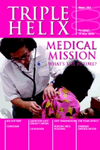Two stories about late termination of pregnancy for fetal abnormality have recently hit the headlines. In the first, a Cambridge student made an allegation of unlawful killing after discovering, in the official national statistics, a case of abortion after 24 weeks for cleft lip and palate.[1,2] The police will have to trace the identity of the mother and doctor in order to pursue the complaint. The second incident, at the Royal Victoria Infirmary in Newcastle, involved a 19 year old woman in her 35th week of pregnancy carrying twins, one of which was diagnosed with a serious heart defect.[3] A fetal cardiologist had recommended selective termination, by intra-cardiac potassium chloride infusion. However, other specialists were opposed to the procedure since the heart defect was operable, with an 85% chance of survival and normal development. The mother decided against the termination when she saw a second cardiologist who gave more accurate information about prognosis.
The 1967 Abortion Act currently sets an upper gestational limit of 24 weeks (on the grounds of viability), beyond which specific criteria must be fulfilled for an abortion to be legal. One of these is fetal handicap (ground E on the abortion certificate), described as '…a substantial risk that if the child were born it would suffer from physical or mental abnormalities as to be seriously handicapped.'[4] Practically all late terminations are carried out on this basis.
The statute does not define 'substantial risk' and 'serious handicap', and it is left to the medical practitioner to form a judgement 'in good faith'. The Royal College of Obstetricians and Gynaecologists (RCOG) has the responsibility of advising doctors on this matter. In their 1996 guidance they make the enigmatic statement, '…a risk may be substantial without satisfying the test of being more likely than not; equally the risk must be more than a mere possibility'.[5] They go on to highlight the importance of a positive antenatal diagnosis, so as to reduce the risk of aborting a normal fetus. 'Serious handicap' is defined according to the World Health Organisation's scale of severity of disability at point 3 or higher: 'Assisted performance. Includes the need for a helping hand (ie. the individual can perform the activity or sustain the behaviour, whether augmented by aids or not, only with some assistance from another person.)'
The guidance also says that 'further factors' should be considered in making a diagnosis, including 'the probability of effective treatment, either in utero or after birth'. The cases cited at the beginning of this article clearly fall outside this definition, as effective treatment was available for both. Following this they would not require a 'helping hand' beyond that needed by any normal infant. The response of an RCOG spokeswoman to the cleft palate case was to affirm the doctor's discretion in deciding what is considered a serious handicap. One may wonder why the college issues guidelines at all if it has no intention to uphold them. The case could be very interesting if it gets to court.
The national statistics (for England and Wales) for the last three years show that these are not isolated cases. Abortions for fetal abnormality in 1999, 2000 and 2001 respectively were 1,859, 1,883 and 1,762.[6] Of these, 6.4% were late terminations (this number may actually be higher, since the Office for National Statistics fail to include 24 weeks and 0 days in a large proportion of their figures for late termination). The time limit of 24 weeks is, of course, irrelevant to those who object to these abortions on the grounds of eugenics or discrimination against disability. Should gestation really make a difference?
In a 1998 report,[7] the RCOG ethics committee argue, for reasons of 'consistency', that fetuses who would not be treated aggressively in a neonatal unit (if delivered at the same gestation) can be justifiably aborted. However, the same logic could be used to say that fetuses who would be treated aggressively in a neonatal unit should not be aborted. But this is not present practice. The RCOG is also assuming that 'killing' and 'letting die' are ethically equivalent acts in all circumstances. They are not.
With over 180,000 abortions a year in England and Wales, it is not surprising that many see abortion as a woman's right and a doctor's duty. But there is something about late termination for treatable abnormality that disturbs even hardened 'prochoice' activists. The RCOG guidelines imply that late termination should not be carried out for treatable abnormalities, or in circumstances where a baby, if born, would be given treatment. However, the RCOG does not appear to feel bound by its recommendations. In a medical climate that increasingly aims at consistency across treatment services, it seems unlikely that such decisions can be left solely to the practitioner's discretion for much longer. The meanings of 'substantial risk' and 'serious handicap' in ground E have not yet been tested in court, but it may not be long before they are.
































